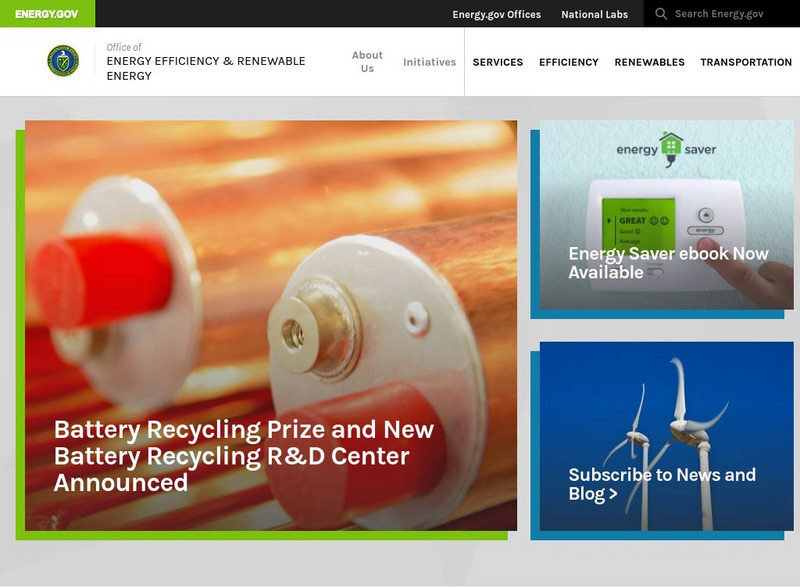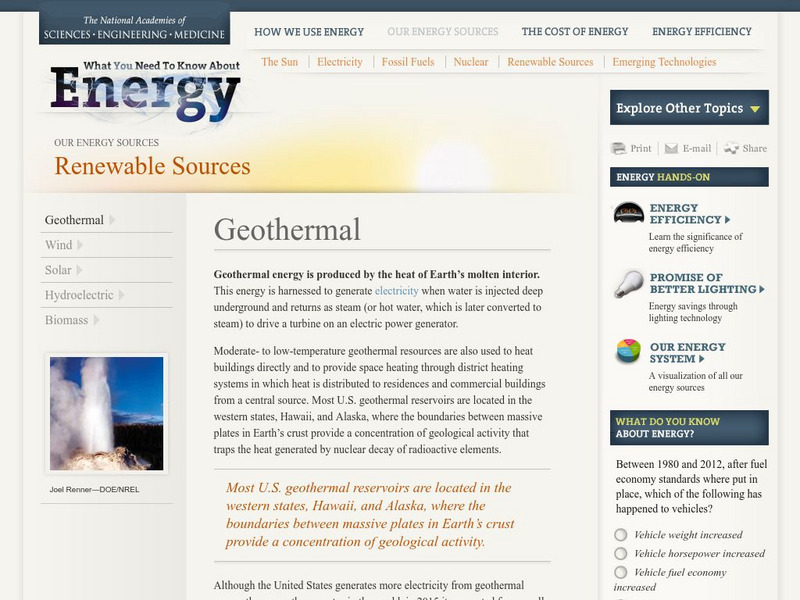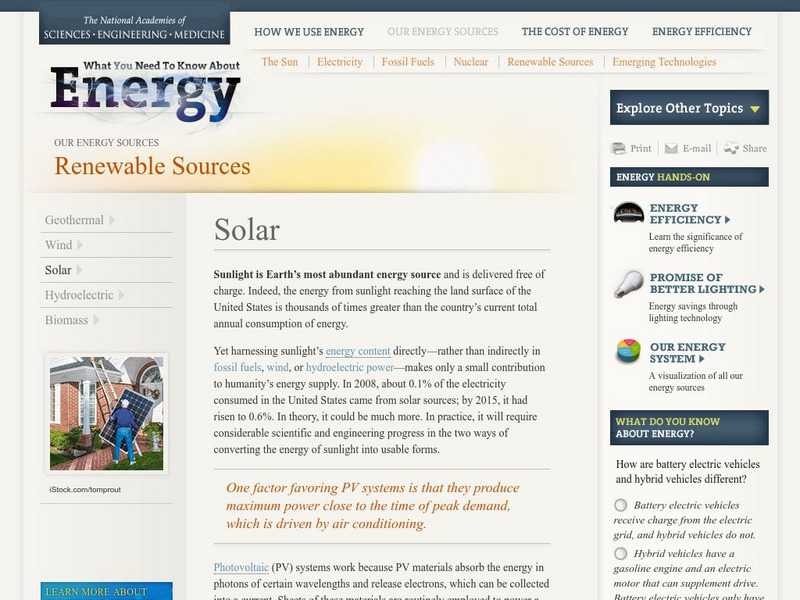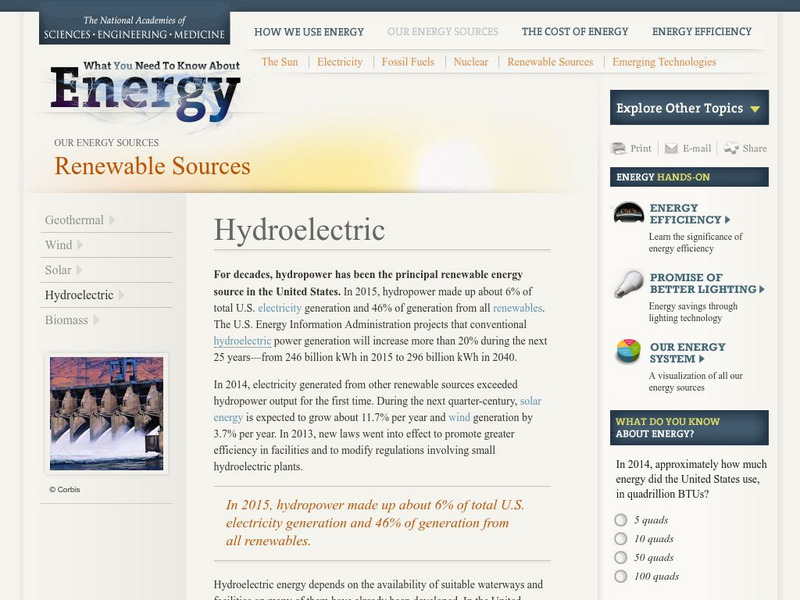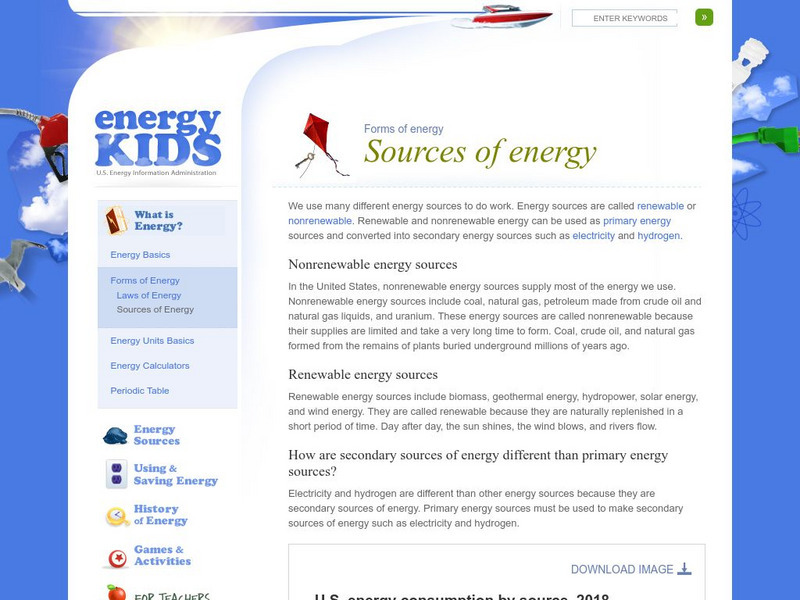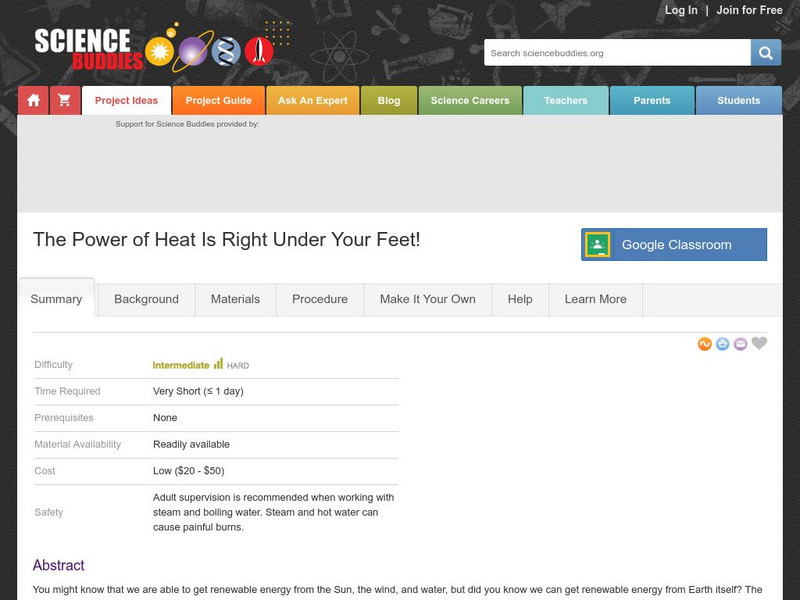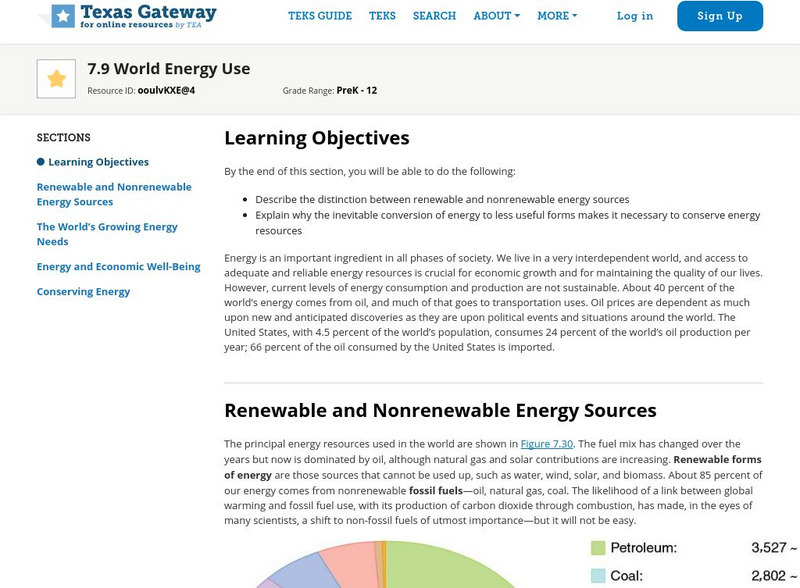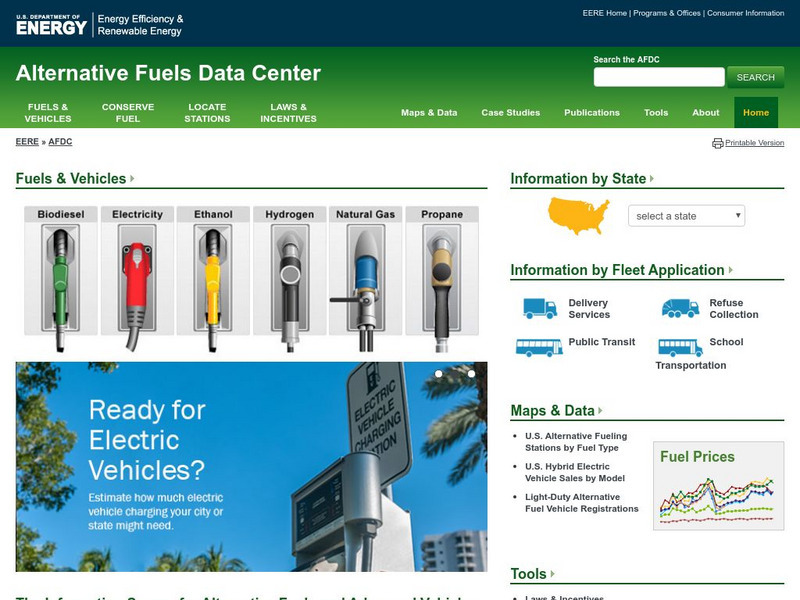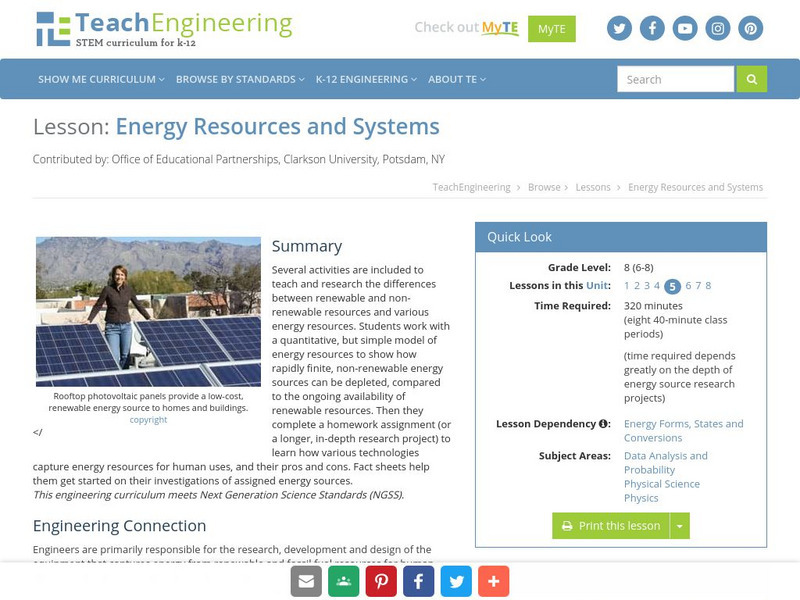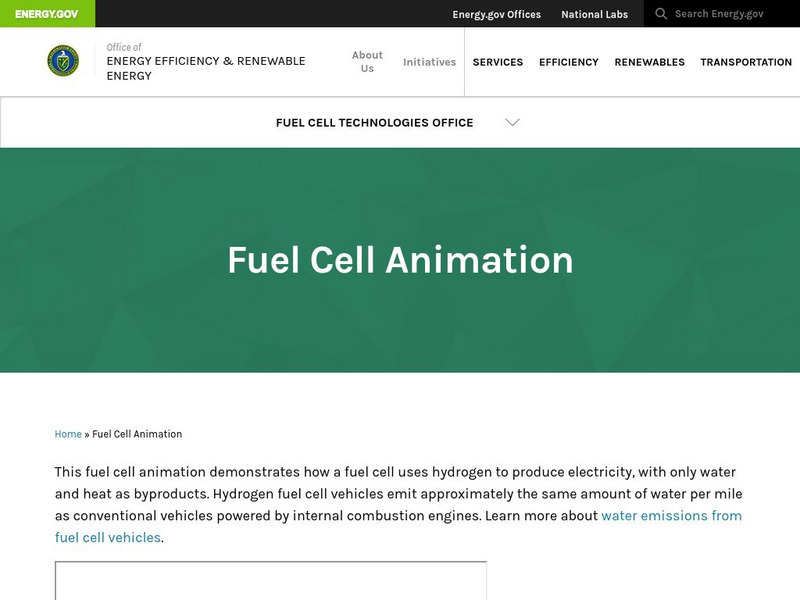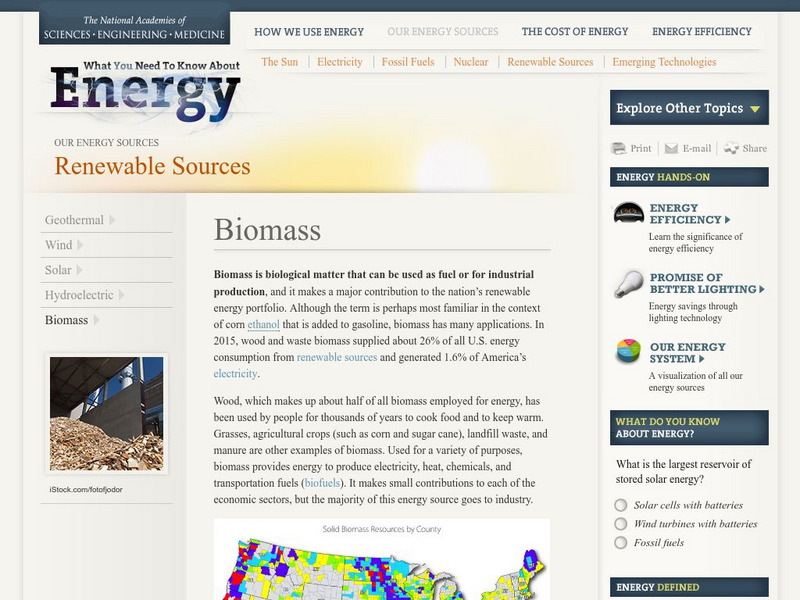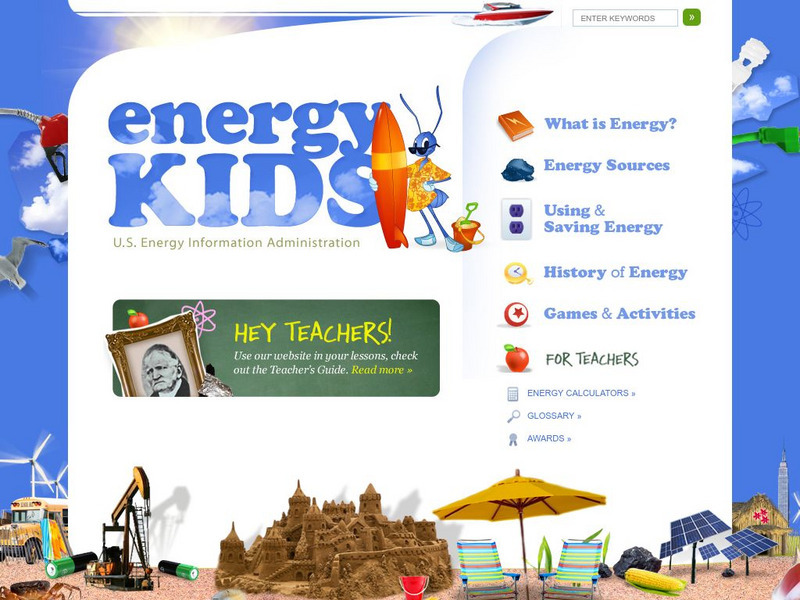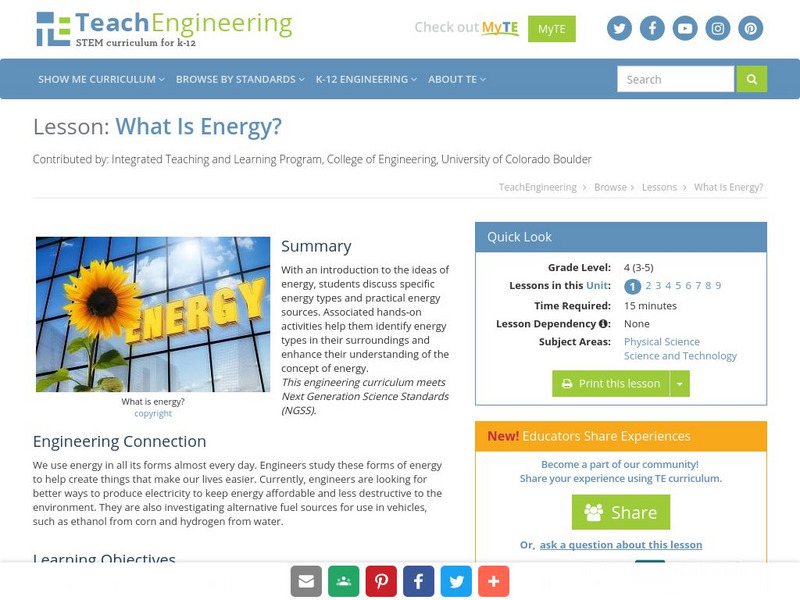Hi, what do you want to do?
US Department of Energy
U.s. Department of Energy: Energy Efficiency and Renewable Energy
Access to information, policy initiatives, advice, and analysis on issues of energy efficiency and renewable energy, from the U.S. Department of Energy. Its network is responsible for tracking the technological, economic, and...
National Academies of Sciences, Engineering, and Medicine
The National Academies: Renewable Sources: Geothermal
Geothermal energy is being used today on a small scale but is an appealing alternative to other sources of energy as it has little impact on the environment. This source of energy and how we are harnessing it are described here.
National Academies of Sciences, Engineering, and Medicine
The National Academies: Renewable Sources: Solar
Solar energy is an appealing alternative to conventional sources of energy because it produces no greenhouse gases. An overview of its advantages and disadvantages is presented here.
National Academies of Sciences, Engineering, and Medicine
The National Academies: Renewable Sources: Hydroelectric
Hydroelectric power has been a major source of energy production in the United States. More recently, other alternative energy sources have taken some of its market share. Hydroelectricity has both advantages and disadvantages, briefly...
National Academies of Sciences, Engineering, and Medicine
The National Academies: Our Energy Sources
The many sources of energy production in the United States are described in this overview. Included are traditional sources, renewable sources, and new energy production technologies.
US Department of Energy
U.s. Department of Energy: Energy Sources: Solar
The U.S. Department of Energy provides links pertaining to solar energy. Understand the current technologies and issues with this resource.
US Energy Information Administration
U.s. Eia Energy Kids: Forms of Energy: Sources
Article explains what is meant by renewable and nonrenewable sources of energy.
Science Buddies
Science Buddies: The Power of Heat Is Right Under Your Feet!
You might know that we are able to get free energy from the Sun, the wind, and water, but we can also get free energy from Earth itself. This source of energy is called geothermal energy and it is all about taking advantage of the heat...
National Geographic
National Geographic: Evaluating Other Energy Sources
A comprehensive lesson where students examine the different costs and benefits associated with renewable and nonrenewable sources of electricity. Includes a 22-question interactive module where they look at real-world data and images...
Texas Education Agency
Texas Gateway: Ap Physics: World Energy Use
By the end of this section, you will be able to describe the distinction between renewable and nonrenewable energy sources and to explain why the inevitable conversion of energy to less useful forms makes it necessary to conserve energy...
US Department of Energy
Eere: Alternative Fuels and Advanced Vehicles Data Center Program
The Alternative Fuels and Advanced Vehicles Data Center Program offers valuable information regarding the use of alternative fuels in the United States. This center is sponsored by the U.S. Department of Energy's Clean City action....
Energy4Me
Energy4me: Energy Technology
Learn about the many sources of energy used around the world.
ClassFlow
Class Flow: Sources of Energy
[Free Registration/Login Required] In this flipchart, students are introduced to the different sources of energy produced on earth. Students will learn the names of different energy sources, the mechanisms of how each works along with...
TeachEngineering
Teach Engineering: Energy Resources and Systems
Several activities are included to teach and research the differences between renewable and non-renewable resources and various energy resources. Young scholars work with a quantitative, but simple model of energy resources to show how...
TeachEngineering
Teach Engineering: Energy
Through nine lessons, students are introduced to a range of energy types--electrical, light, sound and thermal-as well as the renewable energy sources of wind, hydro (water) and solar power. Subjects range from understanding that the...
State Energy Conservation Office-Texas
State Energy Conservation Office:energy Sources: Biomass Energy From Agriculture
Texas has the potential for becoming a leading provider of biomass energy due to its agricultural industry. Some crops produced in Texas, such as canola, switchgrass, sorghum, and sugarcane, have been identified as energy crops that...
US Department of Energy
U.s. Department of Energy: Fuel Cell Technologies Program: Fuel Cell Animation
A series of animated illustrations show how a polymer electrolyte membrane fuel cell works. PEM fuel cells are the most common type used in flex-fuel vehicles.
US Department of Energy
U.s. Department of Energy: Coal: Our Most Abundant Fuel
The U.S. has enough coal to last for the next 200-300 years. So why are we not using more of it? This article describes the different types or "ranks" of coal, the history, and the problems with burning coal for energy.
National Academies of Sciences, Engineering, and Medicine
The National Academies: Renewable Sources: Biomass
The pros and cons of harnessing energy from biomass are outlined. Biomass refers to biological materials that are used to produce energy. Wood and manure are examples of biomass.
National Academies of Sciences, Engineering, and Medicine
The National Academies: Renewable Sources: Wind
The status of wind energy production in the United States is described, with the advantages and disadvantages of this alternative energy source.
Canada Science and Technology Museum
Canada Science and Technology Museum: Background Information for Energy
Energy! What do you know about it? Use this terrific site to find out everything about it through a series of Q&As. Educators will find useful lesson plans at the related Teacher's site.
US Energy Information Administration
U.s. Eia Energy Kids
This comprehensive lesson teaches all about energy, including the different forms, the periodic table, history of human energy use and production, and energy units. It contains an interactive energy calculator, games and activities, and...
TeachEngineering
Teach Engineering: What Is Energy?
With an introduction to the ideas of energy, students discuss specific types of energy and the practical sources of energy. Hands-on activities help them identify types of energy in their surroundings and enhance their understanding of...
US Department of Energy
U.s. Department of Energy: Energy Efficiency and Renewable Energy: Biodiesel
Find answers from the U.S. Department of Energy to your questions about biodiesel, its blends, and benefits. With additional information that explains how the fuel is made and distributed.





